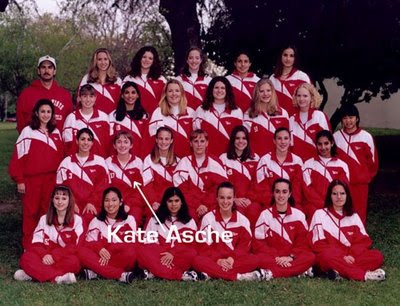SPC Features Kate Asche
 1999 Bella Vista High School Track and Field Team
1999 Bella Vista High School Track and Field TeamSacramento Poetry Center Presents Kate Asche
Mon. Jan. 12, 2009 at 7:30 PM
Host: Emmanuel Sigauke
Kate Asche, M.A., a graduate of the UC Davis Creative Writing Program, is a poet/essayist and writing teacher. She won two Elliot Gilbert Prizes in Poetry and was nominated for University of California poet laureate and for Best New Poets 2006 (Meridian Magazine). She is advisory coordinator of The Tomales Bay Workshops (directed by Pam Houston) and also coordinates UC Davis Extension's Arts and Humanities programs. She has recently joined the Sacramento Poetry Center and also started an online writing group. She plays clarinet in a local trio and quintet and loves to cook (and eat) and travel, as well as relax with her photographer-husband and their two black cats, Tuna and Pearl.
Sample poems:
Hand Song
I was going to sleep one night; I couldn’t conceive of the person with my hands.
I could conceive of the hands, of them doing things—washing dishes, for instance, or tracing the
coils of an old garden hose.
But I couldn’t imagine having the hands; it was too much.
Hands that move things around in a house, that prefigure the geometry of emotional attachment—
two emptinesses entwining.
Alchemical hands of a cook.
All names became impossible, for I have no hands.
All hands become impossible, for I have no have, no am—
Did you think you would stay each way you were forever?
No, there it was, between, and you sensed it.
To put it this way or that way would not be to know it, but to simply move it about.
You would stay put, wouldn’t you, if you could?
Ah, but you’re mistaken.
About life.
About finishing and putting things aside: devotions, cities, poems.
It can only be like throwing yourself, throwing the idea of self, that spheric tangled dreamlife of
flesh and star thistle, let it be “hurled into infinite space” with no arc of return.
In the twelfth century, “understanding” was simply attention, listening.
What do you hear?
A heater, winter, the body breathing.
Sunrise humming the bridge of a song to make today.
The idea of holding a song in one’s hand: what would that be, to hear a hand, singing?
Cradle
When you come, come
with some old shoes, a nail
and a photograph you want to forgive.
Arrive in the evening, I am
preparing for you, I will meet you
at the furthest fence.
You must know by now
how earth’s bones stick out
where she is old: I will love you
that long. Come, let’s make
these broken promises, night colors
bleeding over us, cradle me,
the bluebirds are so blue.
Poem, After Walking
When I think of you,
I think of hushed coastal rain and
linear accelerators. How
with everything always moving at speed
it’s as impossible today
as it was yesterday
to hold onto the things we choose.
The raindrops falling are countable,
no one’s done it and we won’t, not now;
don’t even pick one to catch or be caught by.
They coat our hands,
and their holding of us requires
their reincarnation,
object to quantity,
and this, of course, means total destruction.
At Stanford, across a mile underground,
they throw a single electron against a gold plate,
its contact leaves the fingerprint
of a quantity of spaces,
only spaces,
there is nothing,
not bread or birdsong,
not even that moment,
you filled it with words, a hand
somewhere on—
how could it have been
my body?
I tell you,
we possess nothing, I give you
what I may and may not be,
for between us we can—
we might—
lose nothing.
Comments
Each verse soars.